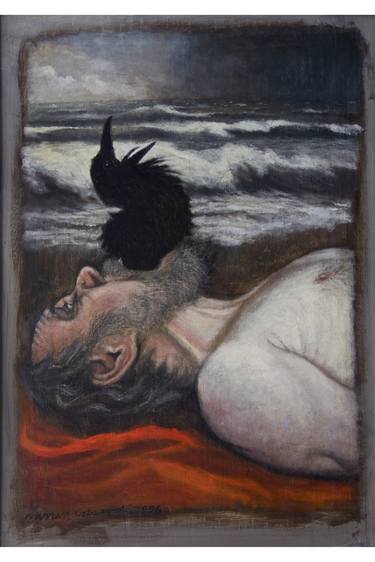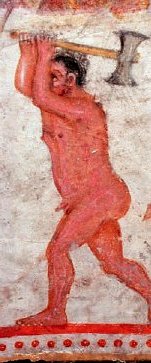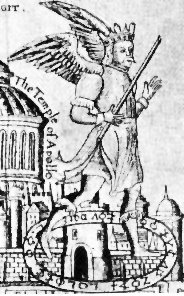Follow the Arrow (original) (raw)

Sculpture by John Raimondi
Abaris the Hyperborean is one of those mysterious magicians who shows up in multiple sources, and has led to additional speculation and apocryphal stories in more recent times. He was first mentioned in Archaic Greek texts, He is said to have been a priest of Apollo in Hyperborea, the mythical place beyond the North Wind, and to have traveled the world with an arrow. I can’t account for the accuracy of the translations I’ve seen online, but it looks like some sources just say he carried the arrow, and others that he actually rode on it. As per Eratosthenes, the arrow was what Apollo had used to kill the Cyclopes after his son Asclepius was killed by a thunderbolt, since they had built such bolts in the first place. He hid it in a temple in Hyperborea, where Abaris found and used it, and it later became part of the constellation Sagittarius.
Picture by Codex Infernal
The combination of an arrow with the far north makes me think of a compass, but they don’t appear to have been used for navigation until the ninth century AD, by the Chinese. The priest left Hyperborea during a plague and came to Greece to serve as a healer, as predicted by Apollo’s Oracle. Abaris is sometimes referred to as a Scythian, as Hyperborea is sometimes said to have been in or near Scythia. There was a tradition that the North Wind lived in Thrace, likely in modern-day Bulgaria, which suggests that whoever came up with that wasn’t aware of anything all that far north. Hence, anything north of that would be loosely considered Hyperborea, if perhaps not the part that’s considered a paradise. Obviously that would have had to have moved farther north as the Greeks became aware of additional northern lands. During the eighteenth century, it apparently became common to associate Hyperborea with the British Isles, hence making Abaris a Druid. The philosopher Iamblicus made Abaris a contemporary of Pythagoras, whom he met in Sicily. They became friends, taught each other, and discussed many different topics, and argued with the tyrant Phalaris. Pindar claimed he was a contemporary of Croesus of Lydia, who, like Pythagoras, lived in the sixth century BC. Abaris is credited with having cured a plague in Sparta, as well as with divination, predicting earthquakes, ending hailstorms, and calming seas. Herodotus wrote of Abaris traveling the world with an arrow and not eating food, but he made it clear he found the story far-fetched, and that’s saying a lot considering what he did include without such judgment. Several books are credited to Abaris, including poetry, prose, and a manual on purification.
Abaris has been associated with several other mystics. One of them, Aristeas of Proconnesus, an island in the Sea of Marmara, is credited with an epic poem called the Arimaspea, of which only two small passages remain extant. It’s said that this epic described a voyage to the north, to Hyperborea by way of the lands of the Arimaspoi and griffins.
He was the subject of equally strange stories himself, mostly involving his soul leaving his body.
Picture by Warren Criswell
One tale said that he was found dead at a shop on his home island, only for someone to see him alive, and then his body disappeared and reappeared six or seven years later. 240 years after that, he showed up in Metapontum in Italy, a place closely associated with Pythagoras, to commission a statue of Apollo, with whom he claimed to have traveled in the form of a raven. That idea seems to be rather more shamanistic than is typical of the ancient Greeks.
He was also briefly mentioned in the Sandman comics.
Then there’s Anacharsis, a sixth century BC Scythian philosopher, likely from Crimea, who journeyed to Athens when it was ruled by Solon and pointed out some of the absurdities in Greek customs.
Is that how Scythians dressed, or was he the first Shriner?
When he returned to Scythia, he was killed by his own brother for having become too Greek, at least according to Herodotus. He was a supporter of simplicity and moderation, and was the first non-Greek to be accepted as a citizen of Athens. He was also credited as the inventor of the two-fluked anchor and the potter’s wheel. A saying credited to him is that the law is like a spider web that catches small flies, but the big ones can break through, still quite relevant today. I don’t know of any indication that he worked miracles, but there are some similarities between his story and Abaris’.
Plato mentioned Zalmoxis as a healer like Abaris, that name apparently belonging to a god worshipped by the Dacians, who held that they would never really die but simply go on to live elsewhere. Herodotus heard from the Pontic Greeks that Zalmoxis was originally a human, a Thracian slave of Pythagoras (again with that guy) who eventually became rich and returned to his homeland to spread the knowledge he had learned. He also stayed inside a cave for three years, and was eventually deified.
Herodotus also included an account of messengers to Zalmoxis being chosen by being thrown onto spears, and a ritual involving firing arrows into the air. There probably isn’t any connection with Zarlox, the original English translation of a boss monster in Dragon Quest II, but the name did remind me of him.
As I wrote earlier, this monster was called Belial, a Hebrew term for wickedness that came to be the name of a demon, possibly Satan himself, in Japanese and in later English translations. John Wood the Elder, an architect in eighteenth-century Bath, England, for some reason associated Abaris with Bladud, a legendary British king and magician said by Geoffrey of Monmouth to have ruled in the ninth century BC, who was credited with founding Bath.
I’ve also seen mentions of a Druid named Abhras who visited Greece in some old Irish poem, but no reference as to what poem this might have been.
This entry was posted in Animals, Authors, British, Comics, Dragon Quest, Greek Mythology, Greek Philosophy, Magic, Monsters, Mythology, Neil Gaiman, Philosophy, Poetry, Religion, Video Games and tagged abaris the hyperborean, abhras, anacharsis, apollo, arimaspea, arimaspoi, aristeas of proconnesus, asclepius, athens, belial, bladud, boreas, constellations, croesus, cyclopes, demons, divination, dragon quest ii, druids, geoffrey of monmouth, griffins, herodotus, hyperborea, iamblicus, john wood the elder, north wind, phalaris, pindar, plato, pythagoras, ravens, sagittarius, sandman, satan, scythia, solon of athens, thrace, zalmoxis, zarlox. Bookmark the permalink.
